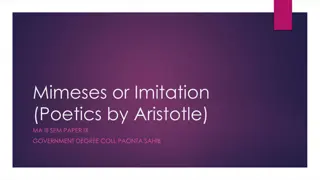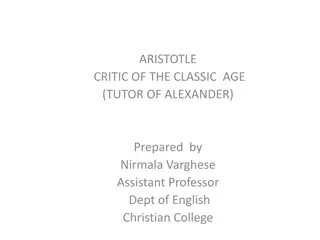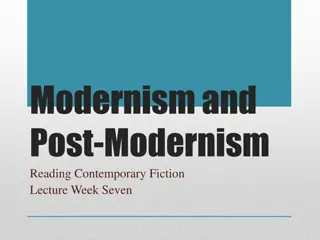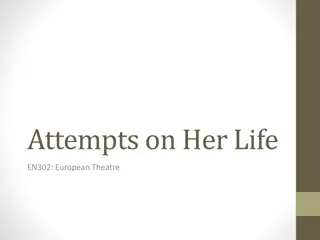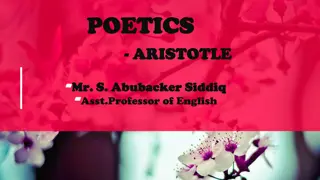The Theory of Mimesis in Aristotle's Poetics
Aristotle's theory of mimesis, outlined in his work "Poetics," contrasts with Plato's view by emphasizing that art imitates nature. He believes that poetry expresses the universal while history narrates the particular, highlighting the poet's freedom from factual constraints to explore larger truths
0 views • 12 slides
Insights into the World of Shakespearean Literature by Dr. Heward Wilkinson
Explore the intriguing world of Shakespearean literature through the eyes of Dr. Heward Wilkinson. Delve into discussions on authorship, mimesis, and the depth of characters in Shakespeare's plays, presented with insightful images and thought-provoking quotes.
0 views • 20 slides
Understanding Aristotle's Poetics: A Critique of the Classic Age
Aristotle, a tutor to Alexander the Great, delves into fundamental concepts in his work "Poetics." He challenges Plato's view of imitation, emphasizing creativity. Focusing on Mimesis, Katharsis, Hamartia, and Spoudaios, he explores the essence of art and tragedy, highlighting noble character and tr
0 views • 7 slides
Insights into Realism and its Critiques in Literature
Exploring the dominance of realist fiction in European literature, this content delves into the evolution of realism during the Enlightenment period, emphasizing its focus on mimicking social reality. It details the concept of mimesis and verisimilitude in creating a realistic narrative structure th
0 views • 19 slides
Exploring European Theatre Traditions
European theatre traditions, as discussed through Lehmann's Postdramatic Theatre and Aristotle's dramatic elements, highlight the unique characteristics that differentiate them from non-European traditions. Concepts such as hamartia, anagnorisis, and mimesis are explored along with the rejection of
0 views • 30 slides
Aristotle's Poetics: An Overview of the Masterpiece
Aristotle's "Poetics" is a seminal work that delves into the essence of poetry, particularly tragedy and comedy. Written around 335 B.C., this treatise challenges Plato's ideas on mimesis and offers insights into poetry's societal significance. Divided into six parts, it explores various elements of
0 views • 15 slides
